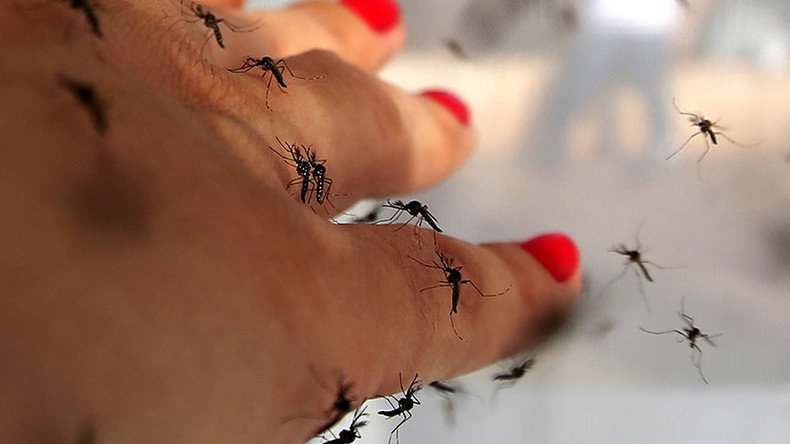Florida governor declares Zika virus emergency in four counties

Florida Governor Rick Scott has declared a public health emergency over the Zika virus in four counties, where at least nine cases of the mosquito-borne virus have been detected. The virus has been linked to brain deformities in babies.
“Although Florida’s current nine Zika cases were travel-related, we have to ensure Florida is prepared and stays ahead of the spread of the Zika virus in our state,” said Governor Scott on Wednesday in a statement. “We know that we must be prepared for the worst even as we hope for the best.”
Scott signed the order to cover the following counties in central Florida: Miami-Dade, Lee, Hillsborough and Santa Rosa counties. That's where all of the cases were detected, and the executive order allows the state’s agriculture department to use more mosquito spray in those areas.
Florida Governor declares state of emergency in four counties with Zika virus https://t.co/K3VoBVU6Szpic.twitter.com/BaVUAOzWOC
— The Independent (@Independent) February 3, 2016
It also directs the Florida Department of Health to make its own decisions about what it needs from the state and the Centers for Disease Control and Prevention.
The Zika virus is transmitted by a bite from an infected Aedes mosquito. The most common symptoms are fever, rash, joint pain, and conjunctivitis (red eyes), according to the CDC. The illness is usually mild, with symptoms lasting from several days to a week. Severe illness requiring hospitalization is uncommon, said the federal health agency.
However, the virus is believed to be linked to birth defects causing brain deformities in babies, and there is currently no cure or vaccine for the disease. In Brazil, clusters of babies with defects have been recorded.
Inside Uganda's Zika Forest, birthplace of the #ZikaVirushttps://t.co/PRprtnA2GYpic.twitter.com/Za7p4E4dLj
— CNN (@CNN) February 3, 2016
International health officials told the Associated Press that Brazil has yet to share enough samples and disease data to show whether the Zika outbreak is responsible for the increase in the number of babies in the country born with abnormally small heads.
One major problem is that, under Brazilian law, it is illegal for researchers and institutions to share genetic material, including blood samples containing Zika and other viruses. Such legal red tape is frustrating efforts to develop diagnostic tests, drugs and vaccines, while US and European laboratories are relying on samples from previous outbreaks.
Concerns over Zika grow as officials warn virus could hit NYC, DC by summerhttps://t.co/PquPEcfbKJpic.twitter.com/XcfRoCnlT2
— RT America (@RT_America) February 2, 2016
The Sun-Sentinel reported that more than five million international visitors came to central Florida in 2014, with 1.9 million of them from South America, primarily Brazil, where the virus is widespread. A US travel alert has been issued for two more destinations because of the Zika virus. Travelers are now being advised to protect themselves while travelling in Jamaica and Tonga, in the South Pacific.
There are now 30 travel destinations on the list, most of them in Latin America or the Caribbean. The government recommends that pregnant women postpone trips to those destinations because of the suspected effect Zika has on newborns.
On Tuesday, US health officials confirmed that person in Texas became infected with Zika through sex, marking the first time the illness was transmitted sexually within the United States. The patient had sexual contact with a person who recently returned from a country where Zika infections have been reported.
First sexually-transmitted case of Zika virus reported in Texashttps://t.co/1LxgnwqQv8pic.twitter.com/w3Qr5Jrqlw
— RT America (@RT_America) February 3, 2016
Officials did not release the name, age or sex of the patient. Dallas County Health and Human Services (DCCHS) said that it received confirmation of the infection from the CDC, but the CDC said that it did not investigate how the transmission occurred, according to Reuters.
"Now that we know Zika virus can be transmitted through sex, this increases our awareness campaign in educating the public about protecting themselves and others," said DCHHS director Zachary Thompson. "Next to abstinence, condoms are the best prevention method against any sexually-transmitted infections."
There have been six confirmed travel-related cases of Zika in Texas, all among residents of Harris County, where Houston is located, the Department of State Health Services said.
There have been over 40 cases of the Zika virus recorded across 12 states and the District of Columbia. Until now, all cases involved travelers returning to the country, with no reports of the virus being transmitted via mosquito within the US.












